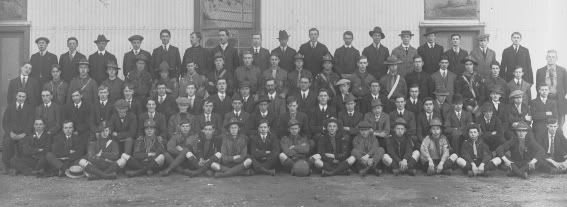The following are samples of the photos of each boatload of boys available from the History Trust of South Australia: http://www.history.sa.gov.au/chu/programs/glass_negs.htm
Monday, April 28, 2008
Sunday, April 27, 2008
Are you related to these boys?
One of the main purposes of setting up this blog is to get in touch with fellow descendants of the farm apprentices. My research doesn't only focus on the brief time the boys spent on South Australian farms - I aim to find out what happened in their adult lives.
Government records can only tell me so much so if you think you are related to the list of boys permanently located on the right hand side of the screen, please make a post or email me at elspeth_g@hotmail.com
Sometime in the near future I will also add a list of farmers who hosted these apprentices, as I hope their families would also be interested!
Government records can only tell me so much so if you think you are related to the list of boys permanently located on the right hand side of the screen, please make a post or email me at elspeth_g@hotmail.com
Sometime in the near future I will also add a list of farmers who hosted these apprentices, as I hope their families would also be interested!
Introductions
172 British boys participated in the South Australian Government's farm apprentice scheme of 1913-14. They were the first government-assisted youth (i.e. unaccompanied) migrants to arrive in the state. They were the predecessors to the better known, 1,400-plus 'Barwell Boys' who arrived during 1922-24 and 125-odd 'Little Brothers' who emigrated in 1927-28.
Very little has been published about this pre-First World War phase of South Australian youth migration. In 2007 I completed a History Honours thesis titled Opportunity for Boys to Become Farmers: The South Australian Government's Scheme for the Emigration of British Lads, 1913-14. It included the following chapters:
- 'The Scheme's Inception and Short-Lived Operation';
- 'The Proponents' Motivations and Intentions'; and
- 'The Ex-Reformatory Boys' Experiences'.
Please contact me if you would like a PDF copy of the Honours thesis.
My interest in the scheme stems from my father's (Peter Grant) recent discovery that my great-grandfather, Lewis Grant, was a farm apprentice and, prior to emigration, had attended the Kibble Institute or Farm School, a reformatory school in Paisley, Scotland. 'Pop' had never told his family about these aspects of his past. The lives of Lewis Grant and the 16 other boys recruited from Kibble featured as case studies in my Honours thesis. So many fascinating stories have emerged and for my PhD, I have expanded my research to study the life stories of all participants in the scheme.
Very little has been published about this pre-First World War phase of South Australian youth migration. In 2007 I completed a History Honours thesis titled Opportunity for Boys to Become Farmers: The South Australian Government's Scheme for the Emigration of British Lads, 1913-14. It included the following chapters:
- 'The Scheme's Inception and Short-Lived Operation';
- 'The Proponents' Motivations and Intentions'; and
- 'The Ex-Reformatory Boys' Experiences'.
Please contact me if you would like a PDF copy of the Honours thesis.
My interest in the scheme stems from my father's (Peter Grant) recent discovery that my great-grandfather, Lewis Grant, was a farm apprentice and, prior to emigration, had attended the Kibble Institute or Farm School, a reformatory school in Paisley, Scotland. 'Pop' had never told his family about these aspects of his past. The lives of Lewis Grant and the 16 other boys recruited from Kibble featured as case studies in my Honours thesis. So many fascinating stories have emerged and for my PhD, I have expanded my research to study the life stories of all participants in the scheme.
Subscribe to:
Posts (Atom)

